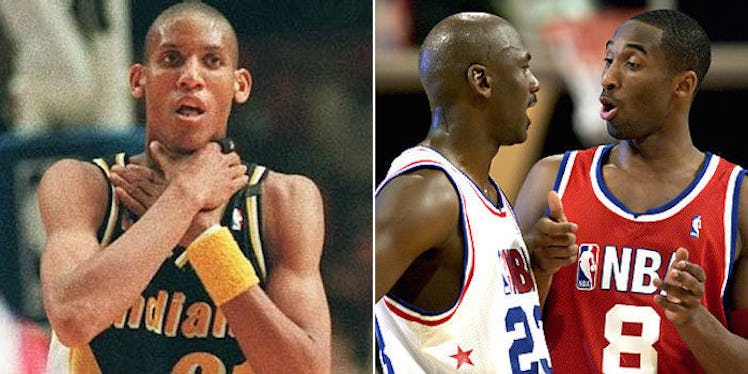We've all played against that player. You know the one, the guy who just can't shut up.
It's a widely accepted fact that those players, the ones who love to talk trash, are the most annoying players to compete against. When they're opponents, they can become sources of instant irritation.
They can, however, be the best players to play with. Sure, when you're up against them, they can get on your nerves (which is kind of the point). When you're playing alongside them, though, you know the positives you're usually going to get.
The fact of the matter is, players who talk the most trash are usually the ones who are the most confident and set the standard of intensity on the court.
Oh, and one more thing: We're not using the word "fact" lightly.
Here are four psychological reasons players who talk trash are sometimes the best teammates you could ask for:
They are more assured in their actions, which helps them execute.
The most prolific trash talkers know talking comes with the condition of having to back it up. And, in most cases, talking the talk is exactly what pushes them to walk the walk.
An article on The Post Game, which was contributed to the site by Men's Health magazine, detailed the findings of research conducted by Florida State on the effects of trash talking.
According to coauthor Gershon Tenenbaum, PhD, of Florida State, talking trash appears to increase a player's confidence and optimism, two important factors leading to better performance.
Reggie Miller would know. Miller, who is remembered as one of the biggest instigators in the 90s, said most of the time when he pushed his opponents' buttons, he was just looking to motivate himself.
He explained,
70 percent of me talking on the court is personally for me to get me motivated and going. 30 percent is to see if I can get in the opponent's head.
All players don't have a supreme level of confidence in what they do, but most athletes probably wish they did.
Anyone who's had his or her fair share of sports experiences will acknowledge such confidence can give a person the assuredness to jump that inch higher, shoot that bit more accurately and get to the rim that much stronger.
Miller had that type of confidence and, as he states himself, the words to invoke it, too.
They know the mental battle is an important part of the game.
ESPN's Jeffri Chadiha might have best summed up how crucial trash talking can be to those who choose to wield the devious weapon.
Sometimes size, strength and speed aren't the only true measures of how well an athlete can thrive in the NFL. Mind games can mean just as much, if not more, in that intensely competitive environment. If you can sneak into an opponent's head with a clever combination of words, then you're already one step ahead of the action.
The most confident and brazen players not only push themselves to unreasonable levels of determination, they also knock opponents off their mental axes.
Miller was so adept at instigating, he was even able to push Michael Jordan to a point where His Airness risked getting himself ejected.
And that says something! After all, Jordan is also one of the most famed trash talkers in history. Why did he, like Miller, get into talking trash so much?
When you trash talk, that's a game. It's a game of psyching out. They try take it as one-on-one competition to me, which totally takes away from their team concept.
Even the greatest player, with all the ability in the world, knew how useful mind games could be.
They can boost self-confidence in their teammates, too.
The best trash talkers won't simply brag about their own abilities in the face of their direct opponents.
Nope, the best trash talkers will even talk trash on behalf of their teammates.
When people talk about how legendary and intense the practice sessions were for the 1992 Olympic Dream Team, they can't do it without mentioning how Magic Johnson would create that intensity by egging his teammates on.
That means when Magic encouragingly barked at Clyde Drexler to “get Jordan back” (after MJ himself started trash talking, of course), those words gave Clyde a bit of extra confidence to actually go out there and do it.
The fact Magic did that is important, too -- a point that is proven with the help of sports psychology.
While amending Michigan State professor Deborah Feltz’s theory on the psychology of confidence in sports, author David Joyce listed verbal persuasion as one of the sources of self-assurance.
Confidence begets focus, and focus begets drive. Next thing you know, Drexler was rejecting a Jordan layup.
Simply put, the players who talk the most trash are usually the ones who push their teammates the most, too.
They set ridiculously high standards and use anything as motivation.
Some guys need an inspirational, 10-minute, once-in-a-blue-moon locker room speech to get going.
Others, like Michael Jordan, president emeritus of the NTTA (National Trash Talking Association), don’t need much.
Just listen to the story Kenny “The Jet” Smith, a former teammate of Jordan at UNC, told some of his peers about MJ (at the 5:26 mark).
Because of the mere suggestion he, as a rookie, would have big shoes to fill (which isn’t the most ridiculous assertion), Jordan took offense and used that feeling as motivation.
Not only did he use it as an incentive to go off, he also had the confidence to proclaim he could do it.
This is Jordan, again, as a rookie. Some trash talkers just have that in their DNA. They might be a pain to play against, but you know you’d want them on your team.
